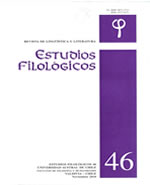Clase social y desarrollo de la conciencia metapragmática de los niños
Contenido principal del artículo
Resumen
Un asunto por ver es si las diferencias socioculturales de los hablantes inciden también en habilidades como la conciencia metapragmática. Dicha capacidad permite al sujeto controlar conscientemente la relación del mensaje lingüístico oral con la información extralingüística cuando se utiliza la lengua (Gombert, 1992), permitiendo una comunicación oral más exitosa. Para observar la posible interacción de esta variable, se ha aplicado el instrumento CMP (Crespo, N.; Alfaro, P. y Pérez, D., 2008), que mide dicha variable, a 100 niños y niñas. Los resultados muestran que, en 3o básico, los estudiantes de los municipalizados obtienen un puntaje 12% más bajo que el de los particulares, mientras que los de 5o municipalizados acortan esta brecha con un puntaje 1,7% inferior que el de sus pares de colegios particulares, permitiendo señalar la importancia de la escolarización en el desarrollo de la conciencia metapragmática.

